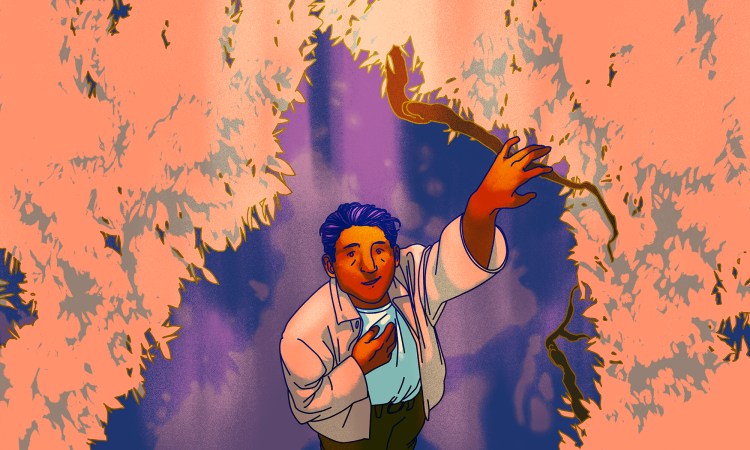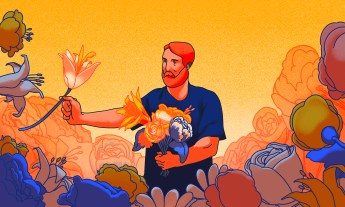
This post is part of TED’s “How to Be a Better Human” series, each of which contains a piece of helpful advice from people in the TED community; browse through all the posts here.
I have struggled with feelings of unworthiness for as long as I can remember.
From the outside, my life looked pretty perfect when I was growing up. My parents had a happy marriage, they were supportive and they earned enough for us to be more than comfortable. I was mostly happy, but I also had a deep sense that something was wrong with me.
My most painful moments were at parties. When I went to Black parties, my friends made fun of me because I was rhythmically challenged and I couldn’t get my awkward middle-school body to mimic the latest dance moves.
Then, as the only Black girl at parties associated with my predominantly white school, I was never chosen to dance. I was never the object of anyone’s attention. I felt like I didn’t belong.
So, at around the age of 12, I decided that the way to cure these feelings of unworthiness was perfection. Simple, right? If I was just perfect, then I would fit in. I would be chosen. I would really be happy.
I threw myself into formal dance classes, worked hard in school and tried to be a supportive and selfless friend. My self-esteem was high when I got good grades and felt included — but it crashed when I didn’t do well academically or was left out.
I held on to the hope that if I could just find someone to love me, then I would finally feel worthy.
In college, busyness became my key strategy for trying to feel worthy. I juggled classes and tutoring with the Black Student Union, student government, gospel choir, step team … I barely gave myself time to breathe, to think, to be.
After college, my attention turned to trying to find a relationship to feel the void. The anxiety and ups and downs I experienced in this quest were exhausting. I remember going out to bars and clubs, and just like in junior high, I was rarely the one chosen to dance. I began to question my attractiveness with my brown skin and kinky hair and whether I’d ever be accepted by a potential partner. I held on to the hope that if I could just find someone to love me, then I would finally feel worthy.
I’ll let you in on a secret: None of it worked!
Not the perfectionism, the busyness, the relationships — well, maybe some of it did for a moment. Right after starting a new relationship or getting a good grade, I felt worthy. But soon enough, my feelings of self-worth slipped away and I was onto pursuing the next thing. As soon as I reached the bar I had set for my worth, it was raised yet again.
Have you ever experienced that?
After several years of therapy, spiritual growth and a PhD in clinical psychology, I’ve finally begun to cultivate an unconditional self-worth and shed the belief that “I’m not good enough”. I’m embracing myself — quirks and all — and this new path is liberating, enlivening and life-giving.
Let me share what I’ve learned with you. But before I do, you might be wondering if this is just more advice about self-esteem.
Unconditional self-worth is the sense that you deserve to be alive, to be loved and cared for, to take up space.
I just want to clarify: Self-worth is not the same as self-esteem.
Our self-esteem is derived from our abilities, accomplishments, social positions and things we believe and we can achieve. We can bolster our self-esteem by improving our skills or performance, and our self-esteem goes up and down depending on how we’re doing in various aspects of our lives.
In contrast, unconditional self-worth is distinct from our abilities and accomplishments. It’s not about comparing ourselves to others; it’s not something that we can have more or less of. Unconditional self-worth is the sense that you deserve to be alive, to be loved and cared for. To take up space.
I have sat with hundreds of students at one of the top universities in the country and when we explore their concerns and dig to the root, we often find that they’re struggling with a deep sense of unworthiness. I believe there are many factors that cause us to feel this way.
Ads tell us that we need to buy things to be loved, accepted or to succeed. Our educational system teaches us that our worthiness as students is based on our grades or test scores. Our parents may have implied they’d love us more if we made the honor roll or the varsity team. Those of us who’ve experienced abuse, sexual assault and trauma may question our personhood and very right to exist. And, as social media pervades our lives, we have also begun to feel that our worthiness is based on the number of followers we have and likes we get.
Whatever the cause, for many of us our self-worth is tied to our accomplishments and possessions. As soon as we fail or lose approval, we experience low self-worth.
Unconditional self-worth is the antidote to low self-worth. It is a way out of self-criticism, shame and unhealthy behavior. It is a way out of depression, anxiety and substance abuse. It is time for us to base our worth on the fact that we are human to cultivate a worth that persists even when life does not go as we hoped.
So what keeps so many of us from cultivating unconditional self-worth?
Some people might fear that if they get too satisfied with themselves, they won’t be motivated to grow and change. Others could feel that accepting themselves as worthy would be arrogant. And some may simply believe that feeling worthy is just not possible.
I often wonder:
- What the world would look like if we all cultivated unconditional self-worth?
- What would you find the courage to do if you knew you were worthy?
- What would you dare to dream if your self-worth wasn’t at stake?
- What would you stop doing if you knew you were already worthy?
I believe people would resolve conflicts without violence and that more people would dare to do amazing things. I believe that if our self-worth wasn’t on the line, the world would look a lot better and more peaceful for all of us.
So how do we make this vision real?
See if you can let go of the thoughts you have about how the way you think, feel or look should be different. Instead, focus on the things you like about yourself.
Cultivating unconditional self-worth is an ongoing practice. Here are four ways you can begin to feel more worthy starting right here, right now:
1. Forgive yourself
Many of us struggle to feel worthy, because we are angry with ourselves about past mistakes. Forgiveness involves acknowledging and accepting what has happened. Acceptance releases us from blaming ourselves and others and allows us to move forward.
To forgive yourself, reflect on the circumstances that led to past mistakes, acknowledge the pain you experienced and identify what you learned from the situation. Then say to yourself “I forgive you” — in an honest and kind way.
2. Practice self-acceptance
I think many of us struggle with low self-worth because we think there’s something wrong with us and we refuse to accept ourselves the way we are. We receive so many messages that we are not OK the way we are. We’re told that we need to change our bodies, our clothes, our jobs or even our personalities to be acceptable.
See if you can let go of the thoughts you have about how the way you think, feel or look should be different. Instead, focus on the things you like about yourself. Over time, begin to embrace your quirks — your awkward laugh, your crooked smile, your unusual way of thinking about things. Through this acceptance, you’re acknowledging that you are worthy just the way you are.
Knowing that we are not alone in our struggles and pain reminds us that challenges don’t make us unworthy.
3. Be there for yourself
When life gets rough, many of us abandon ourselves during times of challenge. We engage in harsh self-criticism — which only leaves us feeling worse. What we need most when we are going through a difficult time is for someone to say “I see you. I see how badly you’re hurting. I’m here.”
We can do this for ourselves.
The next time you experience emotional pain, acknowledge how you were feeling and offer yourself some comfort. Place your hand on your chest, give yourself a hug or say something kind and soothing to yourself.
4. Connect to supportive people
Low self-worth can leave us feeling isolated and alone. When we think there’s something wrong with us, we tend to pull away from our relationships, and this isolation only exacerbates our feelings of unworthiness. Knowing that we are not alone in our struggles and pain reminds us that challenges don’t make us unworthy. Connecting to people who are supportive helps us to get in touch with our humanity and our sense of worth.
One last thing: The journey to unconditional self-worth is not always easy. The path is not straight or smooth, and you’ll face setbacks along the way — I certainly have.
It takes courage to free yourself from the conditions you’ve placed on your worth. The process of forgiveness can be messy, it can be scary to accept ourselves as we are, being there for ourselves can put us face to face with emotional pain, and connecting to others can make us feel vulnerable.
But I’m here to tell you that this journey is also beautiful and worth taking. On it, you’ll find strength, become grounded in your humanity and know that you are worthy. So I challenge you to embrace yourselves and begin living from a place of worthiness to find your own metaphorical dance floor and move freely.
Yes, I said dance floor.
I felt free, I felt exuberant, I felt full of life, I felt worthy.
On my journey, I found myself returning to the dance floor because that’s where my own struggles with unworthiness began.
It turns out, I’ve learned a few new moves since junior high.
A few summers ago, I went to a jazz festival by myself. As I sat there watching people dancing to the live music, I longed to get up and join them. But all of my old insecurities about my dance moves and not being chosen showed up.
Luckily, an elderly man invited me to dance, and after a song or two with him, I began dancing on my own. And as the notes of Latin jazz filled the air and I moved my body to the rhythm, I felt free, I felt exuberant, I felt full of life, I felt worthy.
This talk was adapted from a TEDxDePaulUniversity Talk; to learn more about Dr. Adia Gooden and her work, visit her website.











